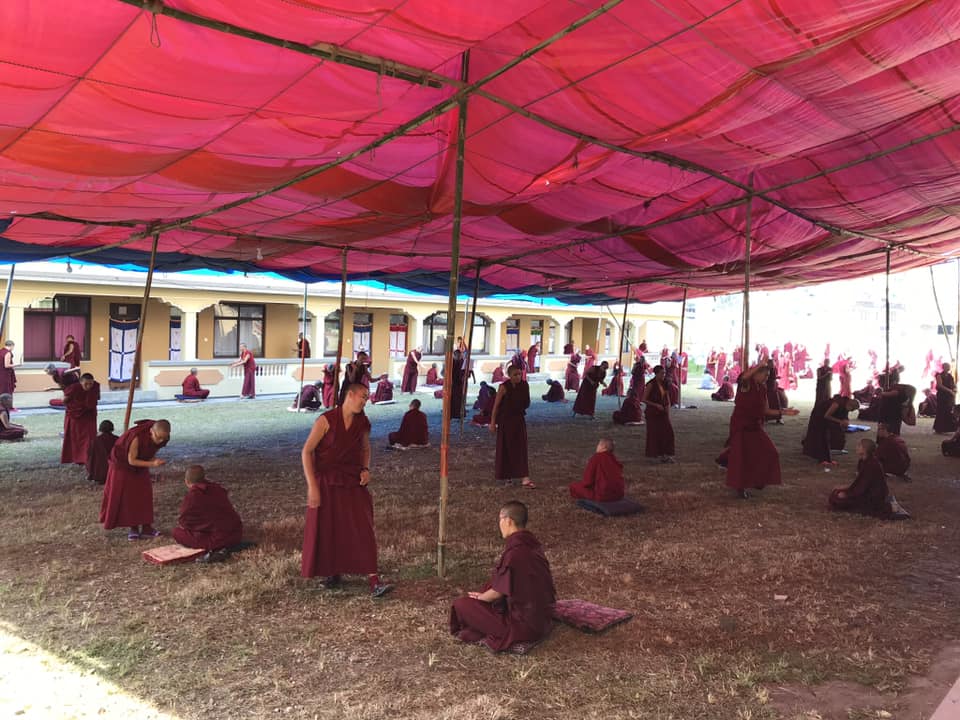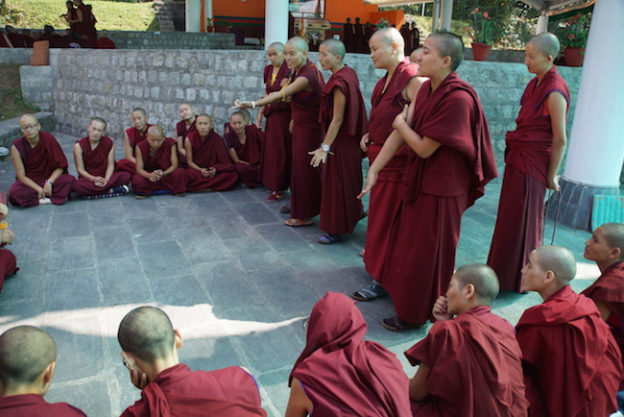We are delighted to report that the 2018 Inter-Nunnery Debate event, called the Jang Gonchoe, was fully funded.
The annual, inter-nunnery debate called the Jang Gonchoe was held at Kopan Nunnery in Nepal from 3 October to 4 November 2018. More than 600 nuns from nine nunneries in India and Nepal attended this powerful educational opportunity.
The Importance of Monastic Debate
Monastic debate is the traditional mode of study of the profound texts of the Tibetan Buddhist tradition. Through debate, the nuns test and consolidate their classroom learning. For many nuns, taking part in the Jang Gonchoe is an essential component of working towards higher academic degrees, such as the Geshema degree, which is roughly equivalent to a PhD in Tibetan Buddhist philosophy.
Prior to 1995, there was no Jang Gonchoe for nuns, although Tibetan monks have held their Jang Gonchoe for centuries. The chance to have nuns from many nunneries gather and intensively debate with each other is a relatively new opportunity for ordained Buddhist women. The Tibetan Nuns Project has been fully supporting the Jang Gonchoe for nuns since 1997. Next year will be its 25th year.
In 2014, the Tibetan Nuns Project launched a Jang Gonchoe Endowment Fund so that this vital educational opportunity may continue for years to come. Unfortunately, we’re still a long way from reaching our goal for the fund. You can learn more here.
The fact that so many nuns wanted to attend this year’s event is a testament to both its incredible value as a learning opportunity and the nuns’ growing confidence. In the early years of the Jang Gonchoe, it was difficult to find nuns to participate because they lacked confidence and felt uncomfortable to join in. Now the nuns are eager to take part. They know what an important chance it is for them to gain skills in debating and to help them with their studies.

Nuns debating in pairs at the 2018 Jang Gonchoe at Kopan Nunnery. Photo courtesy of Tizi Sonam
The 2018 Jang Gonchoe
In past years, the number of nuns who participated in the Jang Gonchoe was also limited by the ability of the host nunnery to accommodate and feed visiting nuns from other nunneries. However, Kopan Nunnery is a large nunnery and had the facilities and capacity to house many nuns, so many more nuns were able to attend this year. We are extremely grateful to our supporters, including the Pema Chödrön Foundation and the Rowell Fund for Tibet/ICT, whose generosity enabled so many nuns to take part by helping with their food and travel costs.
The 9 nunneries that took part this year were:
- Dolma Ling Nunnery and Institute, near Dharamsala, India (min. 35 nuns and 2 teachers)
- Geden Choeling Nunnery,Dharamsala, India (min. 35 nuns and 2 teachers)
- Jamyang Choeling Nunnery, Dharamsala, India (35 nuns and 2 teachers)
- Thujee Choeling Nunnery, South India (35 nuns and 2 teachers)
- Kopan Nunnery, host nunnery, Nepal
- Jangchup Choeling, Nepal (35 nuns and 2 teachers)
- Jangsemling Nunnery, Kinnaur, India (24 nuns and 1 teacher)
- Jampa Choeling Nunnery, Kinnaur, India (16 nuns and 1 teacher)
- Yangchen Choeling Nunnery, Spiti, India (14 nuns and 1 teacher)
At the conclusion of this year’s Jang Gonchoe, the ten nuns who passed their fourth and final Geshema exams in August took part in a formal debate process called damcha.

Nuns line up to debate with the Geshemas in the damcha. This joyous and inspiring event was held for two days on November 3rd and 4th and was the final formal step in the Geshema graduation process. Photo courtesy of Tizi Sonam
The 2018 Geshema Graduation Ceremony was held on November 5th at Kopan Nunnery with teachers and about 600 nuns from at least 9 nunneries in India and Nepal in attendance.
More About Tibetan Buddhist Debate
Here’s a short video made a number of years ago by the nuns at Dolma Ling Nunnery about the importance of monastic debate.

